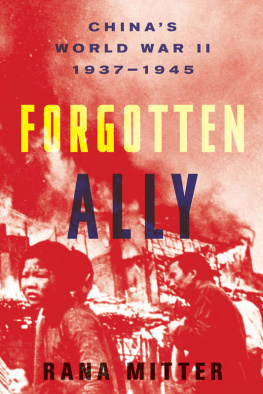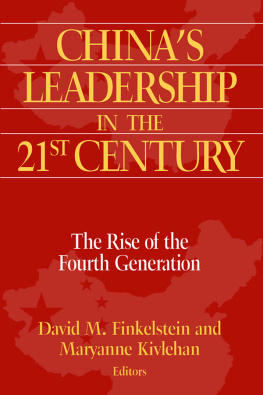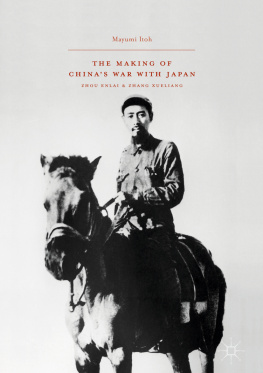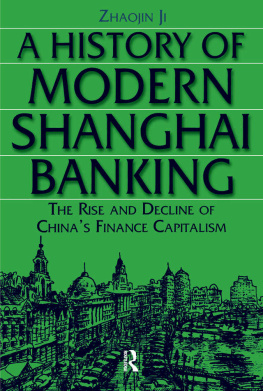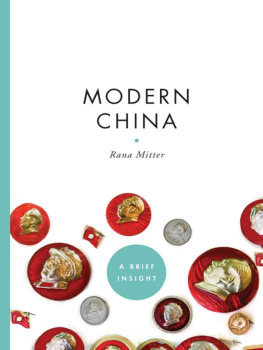A BITTER REVOLUTION
Rana Mitter is University Lecturer in the History and Politics of Modern China at Oxford University, and a Fellow of St Cross College. He is the author of The Manchurian Myth: Nationalism, Resistance, and Collaboration in Modern China (2000) and co-editor (with Patrick Major) of Across the Blocs: Cold War Cultural and Social History (2003). He has appeared on History Channel television documentaries and on BBC radio programmes including Start the Week, Night Waves, and Brief Lives. In 2004, he won a Philip Leverhulme Prize for his work on the history and politics of modern China.
THE MAKING OF THE MODERN WORLD
This group of narrative histories focuses on key moments and events in the twentieth century to explore their wider significance for the development of the modern world.
PUBLISHED:
The Fall of France: The Nazi Invasion of 1940, Julian Jackson
A Bitter Revolution: Chinas Struggle with the Modern World, Rana Mitter
FORTHCOMING:
The Vietnam Wars: A Global History, Mark Bradley
Algeria: The Undeclared War, Martin Evans
The Burning of Louvain, Alan Kramer
SERIES ADVISERS:
P ROFESSOR C HRIS B AYLY , University of Cambridge
P ROFESSOR R ICHARD J. EVANS , University of Cambridge
P ROFESSOR P AUL P RESTON , London School of Economics
P ROFESSOR D AVID R EYNOLDS , University of Cambridge
P ROFESSOR M EGAN V AUGHAN , University of Cambridge
A BITTER REVOLUTION
Chinas Struggle with the Modern World
RANA MITTER


Great Clarendon Street, Oxford OX2 6DP
Oxford University Press is a department of the University of Oxford.
It furthers the Universitys objective of excellence in research, scholarship,
and education by publishing worldwide in
Oxford New York
Auckland Bangkok Buenos Aires Cape Town Chennai Dar es Salaam Delhi Hong Kong Istanbul Karachi Kolkata Kuala Lumpur Madrid Melbourne Mexico City Mumbai Nairobi So Paulo Shanghai Taipei Tokyo Toronto
Oxford is a registered trade mark of Oxford University Press
in the UK and in certain other countries
Published in the United States
by Oxford University Press Inc., New York
Rana Mitter 2004
The moral rights of the author have been asserted
Database right Oxford University Press (maker)
First published 2004
First published in paperback 2005
All rights reserved. No part of this publication may be reproduced, stored in a retrieval system, or transmitted, in any form or by any means, without the prior permission in writing of Oxford University Press, or as expressly permitted by law, or under terms agreed with the appropriate reprographics rights organizations. Enquiries concerning reproduction outside the scope of the above should be sent to the Rights Department, Oxford University Press, at the address above
You must not circulate this book in any other binding or cover and you must impose this same condition on any acquirer
British Library Cataloguing in Publication Data
Data available
Library of Congress Cataloging in Publication Data
Mitter, Rana, 1969
A bitter revolution : Chinas struggle with the modern world / Rana Mitter.
p. cm.
Includes bibliographical references and index.
ISBN 0192803417
1. ChinaHistory20th century. 2. ChinaPolitics and government20th century.
I. Title: Chinas struggle with the modern world. II. Title.
DS774.M55 2004
951.06dc22 2004041561
ISBN 0192803417
ISBN 019280605X (Pbk.)
1 3 5 7 9 10 8 6 4 2
Typeset in Janson
by RefineCatch Limited, Bungay, Suffolk
Printed in Great Britain by
Biddles Ltd, Kings Lynn, Norfolk
Didnt you say, as we were going through those streets, They never greet me, they hate me? Well, youre a clever man, you ought to know that those children dont hate you at all its just that theyve got nothing to eat.
I think they hate me, [the priest] told me, slowly, because theyve abandoned their belief in God.
dn von Horvth, The Age of the Fish (1939)
[orig. Jugend ohne Gott, tr. R. Wills Thomas]
For Pamina
Contents
Preface
Chairman Mao, more than a quarter-century after his death, probably remains the one Chinese name generally well known in the west. From there onwards, the map has a lot of blank spaces. Despite this, I felt it was possible, and worthwhile, to try to write a book explaining how and why so much of contemporary Chinese politics and culture is heavily shaped by what happened in the early twentieth century. This book would not be a survey obliged to deal with every single aspect of modern Chinese history (and end up very long as a result), nor would it be a piece of very specialized scholarship, of the type essential to those working in the academic field but often inaccessible to those outside it. I hoped it would be possible to integrate the political, cultural, and social history of China, and give some idea of how the places where people lived, loved, and worked affected how they thought and behaved. I also felt it important to showcase some of the new directions taken by writing on Chinese history, politics, and literature in the last few decades, particularly as China itself has become much more accessible to researchers.
I hope that this book will act as a useful interpretation of modern Chinese history and politics, and show how the two are linked. It is a clich, but nonetheless true, that one cannot fully understand what is going on in China today if one does not understand what happened there in the past. Anyone who reads a newspaper will see that Chinese politicians are acutely conscious of their own history. The Communist leadership greeted the return of Hong Kong in 1997 as the ending of 150 years of imperialist aggression in China; the 1989 Tiananmen Square demonstrators compared themselves with students who had protested in that same spot 70 years previously. This book starts with one brief moment in Chinese history, a demonstration in Beijing on 4 May 1919, goes on to look at the cultural and social turmoil that surrounded that event, and argues that the ghosts of what happened that day are visible, often in very strange and unexpected ways, in the development of modern China. This book does not use the rise to power of the Communist Party as the central narrative. Instead, it argues for a more diverse way of looking at what Chinese politics was in the past, and what it might be again. The Communists are very important, but they are not the whole story. For those who are visiting or studying China in the early years of the new millennium, I hope that this will be a stimulating way to think about this immensely important country.
The book has also had to come to terms with the often rather closed-off nature of Chinese studies: things that need careful explanation to even well-informed readers often seem obvious to experts. For those who study China, names such as the May Fourth Movement, Lu Xun, or Heshang are well known. Yet I hope that some of the lesser-heard voices that are presented here may be of interest even to those who know China and its twentieth century well. I also hope that this attempt, even if tentative, to downplay the Communist revolution of 1949, which for so long acted as a gaping divide between history and contemporary politics in the China field, may be useful, and that it may be productive to look at Chinas twentieth century through the continuities, as well as changes, that run across the decades. Finally, those familiar with Chinese politics know that it is a commonplace that the spirit of May Fourth has remained tremendously important in China since the events of 1919: this book attempts actively to trace
Next page

